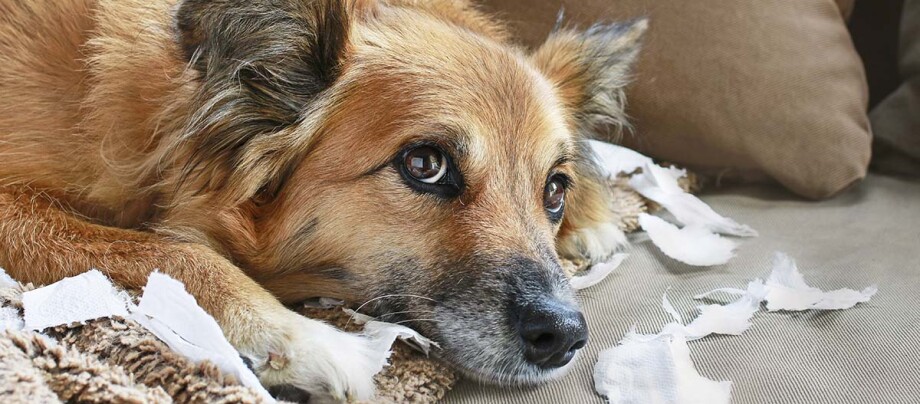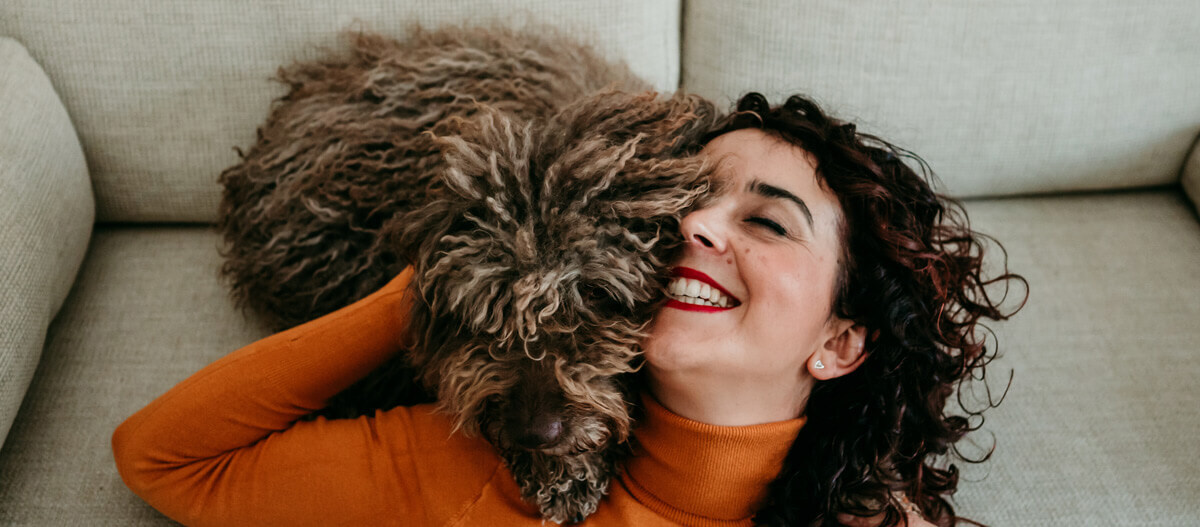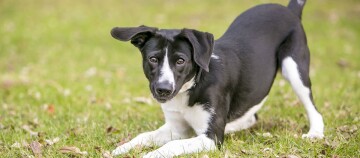Puberty in Dogs – What You Should Watch Out for During Puberty
07.10.2022 - Reading time: 4 minutes

Can’t be bothered attitude, explosive outbursts of activity and no respect for authority: dogs in puberty are surprisingly similar to teenagers. But don’t worry – even this “phase” comes to an end. Find out here what to expect when your dog hits puberty and how you can deal with it.
What causes puberty in dogs?
Depending on the breed, puberty initially starts between 6 and 12 months of age along with sexual maturity. Large breeds enter the pubescent phase a little later, females a little earlier than males. The female dog will now come into heat for the first time, the male dog begins to lift his leg to pee and suddenly finds female dogs very exciting. In addition, he will now increasingly compete with other male dogs. Many dog owners notice the onset of puberty not only by sexual maturity, but by the fact that their previously well-behaved four-legged friend’s good behaviour suddenly seems to disappear.
During puberty, there are various changes that coincide in the organism of a dog which not only have physical effects but also cause confusion.
Your pets will experience these changes during puberty:
- Changes in the neurones due to rapid growth spurts of the nerve cells: In order to optimise brain efficiency, their connections undergo a real restructuring. Important connections are strengthened, less essential ones are reduced. The main site of these changes is the prefrontal cortex: a brain region that translates cognitive processes, thinking and learning into appropriate reactions. During puberty, there may be impulsive behaviour. Another area of the brain, the amygdala, also grows during puberty. This is the centre for emotions such as fear and aggression. The dog’s emotional life also becomes a little more unpredictable at times.
- Hormonal fluctuations: dopamine and testosterone – the dog’s hormone balance and receptor receptivity are also in flux. This can lead to stress and nervousness in the dog. The animal reacts disproportionately both to external stimuli and to situations it is already familiar with. These are the typical mood swings that puberty also causes in human teenagers.
What are the signs of puberty in dogs?
Canine puberty manifests itself mainly by the dog responding to its environment with mood swings and a certain degree of volatility. Their play with other dogs becomes rougher. How strong and the form in which these effects are expressed depends on the individual animal. However, the common denominator for any form of grouchiness is the establishing of “adult” behaviours.
What are the stages of puberty in dogs?
There are two sensitive periods in a dog’s life. It starts with the ranking phase, the time between the 13th and 16th week of life, roughly comparable to the defiant phase in toddlers. Puberty is the other difficult phase. Depending on the breed of dog, it begins between the 7th and 12th month of life. Large breeds enter puberty later; in females, the starting signal is the first heat. In males, the transition from young to semi-adult is gradual. There is a small indication of it when male dogs lift their legs for the first time when urinating and make a mark. Puberty slowly fades away when the dog is between two and three years old and is fully grown.
The good news is
that after a few months, the problem gets resolved. During puberty, your four-legged friend also experiences a second bonding phase, and you can use this phase to strengthen your relationship.

What do I need to watch out for during puberty in dogs?
To get your dog through the challenges of puberty, you need strong nerves, patience and a lot of love. Whereas the young dog is unconditionally focused on you as the leader of the pack, the youngster is trying to liberate himself. The cute puppy sometimes turns into a stubborn monster. You need to prepare yourself for this when you take a young animal into your family and be ready for it.
You should watch out for this during puberty:
- Authority: always keep the upper hand. Show understanding for the pubescent dog, but don’t let them get away with any bad behaviour. You should remain the unimpressed, superior leader to whom the animal can orient itself even when undergoing the greatest rollercoaster of emotions. It will benefit from the security at your side, especially if the dog develops fearful tendencies. But even if it behaves likes a troublemaker, you should react in the appropriate way and not bestow too much attention on its conduct. Instead, present yourself as the superior leader of the pack who is unimpressed.
- Patience: some pubescent dogs don’t seem to remember what they have learned, seem to be slow on the uptake or act like you are talking to them when you call them. Be understanding and devote a lot of time to your dog right now. Get it interested in learning and teach it new tricks and commands with plenty of praise and reinforcement – often all it needs is a refresher.
- Protection: a pubescent dog has no sense of danger or risk. Keep a watchful eye on the dog and intervene if the adolescent pup gets into trouble. For example, keep him on a short lead if he is picking fights with other dogs.
Editor’s tip:
during puberty, avoid major changes such as moving house or learning something completely new – both of these could overwhelm your four-legged friend during this sensitive phase.
Should I get my dog neutered now?
No. If the dog’s hormones are going crazy, you might like the idea, but if you think you’ll be able to handle your pet better after neutering, you might be disappointed. It is true that neutered males no longer chase every female in heat and their aggressive territorial behaviour diminishes. However, most behaviour patterns are the result of upbringing and character. Hormones have little influence on this, particularly since you don’t avoid puberty with an operation like this: the dog should only be neutered when it is physically and mentally mature. Dogs that are neutered before or during puberty show more aggression later on or they become over-anxious. In any case, it is advisable to try a hormone chip first.


